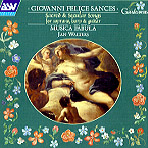Italian composer Giovanni Felice Sances was one of those multi-talented musicians who may not be known well today, but who in the 17th century enjoyed a relatively long, happy, and successful career. From his youthful near-celebrity as a soprano to his final years as Imperial Kappelmeister in the Vienna court, Sances not only entertained with his vocal performances but also showed remarkable skill and even considerable innovation in his sacred and secular compositions, which include masses, operas, and various types of songs. The majority of this program is devoted to songs for both one and two voices, and is complemented by an assortment of instrumental works by three of Sances’ contemporaries, performed on baroque guitar or Italian baroque triple harp. The ensemble Musica Fabula, formed in New York in 1992, makes a very favorable impression with its two outstanding soprano soloists and exceptionally competent instrumental soloist/accompanists. If you’re familiar with the chamber vocal works of Monteverdi, you’ll at least be at home in this genre, which emphasizes vocal virtuosity while maintaining an easy accessibility, exemplified in attractive melodies and theatrical stylistic and expressive attributes.
I was thoroughly enchanted by soprano Liliana Mazzarri’s beguiling rendition of the catchy, irresistible song “Fuggi fuggi il mio cor”, a gem that will immediately dispatch any singer to the music store to try to obtain a personal copy to introduce on the next recital. Duets such as the opening “Che sperasti o il mio cor” have the built-in energy and dramatic punch to draw us eagerly and willingly into this unfailingly entertaining program. “Ursurpator tiranno” is the first known vocal piece to use the compositional technique of descending tetrachords as a guiding structural device. Soprano Sarah Pillow and the aforementioned Liliana Mazzarri are hard to resist, with their enthusiastic and vocally assured renditions of the songs–and their partners provide sensitive and tasteful accompaniments that are virtually immune from criticism. No, these are not earth-shaking performances of revelatory music. But that’s missing the point. These pieces were intended for immediate consumption, with no real prospects for repeat performances. We’re lucky to have them–and Sances is fortunate to have such exemplary, well-prepared advocates to revive these pieces for 21st-century listeners. The sound is immediate, intimate, and true to voices and instruments.
































